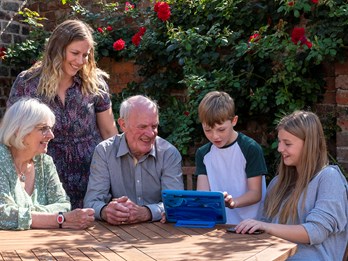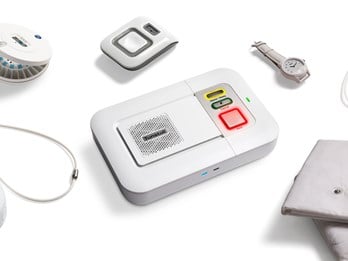Driving Integration: Reflections from NHS Confed Expo
Driving Integration: reflections from NHS Confed Expo and the role of technology in transforming healthcare
Jun 22, 2023
 |
With the NHS Confed Expo 2023 just over a week ago, Patricia Wynn, Chief Health & Care Strategy Officer for Tunstall Healthcare reflects on the discussions that took place and her five key takeaways when it comes to the role of technology in driving integration and transforming healthcare. It’s been a week since I returned from #NHSConfedExpo, and almost a month since I started my new role at Tunstall Healthcare. While attending sessions and reconnecting with old friends from across the past decade working with the NHS, I reflected on why I made the move to ‘social care’ technology. |
The event reaffirmed my optimism about the potential for integrated care (not just in the UK, but across the world) and the pivotal role that technology must play in accelerating its progress.
Here are my top five takeaways:
1. Integrated Care Systems (ICSs) are here to stay
With the recent release of the UK government response to the Hewitt Review and both political parties recommitting to integrated care and ICSs, it is evident that embracing the success of ICSs is the right path for professionals and populations alike. Health and Social Care Secretary, Steve Barclay, highlighted the importance of ICSs, stating that they are essential for delivering the long-term plan for the NHS. Shadow Health and Social Care Secretary, Wes Streeting, also recognised that ICSs are the future of the NHS, providing joined-up care that meets the needs of patients and communities. It’s clear that no matter the political direction of travel—the future is in integrated care.
2. Health and social care collaboration must be at the heart of the ICSs
To achieve the four key aims of ICSs, the NHS cannot work in isolation. Collaboration across sectors is essential to keep people healthy, reduce inequalities, enhance productivity and value, and support economic and social development. NHS Chief Executive, Amanda Pritchard, noted that the traditional divide between health and social care is a barrier to providing people with the care they need. By working together, she emphasised how we can reduce duplication and fragmentation, as well as share best practices, develop new models of care and co-invest in technology.
3. Successful partnership working requires a common purpose and focus
During the Population Health Management (PHM) Development Programme, Dr Martin McShane always encouraged people to ‘Think Big, Start Small'. During one of the sessions, I was inspired by an integrated team from Sheffield who clearly take this mantra to heart. They presented their work on ‘Frailty and Multimorbidities: A Whole Person Approach to Address Inequality’, which involves multidisciplinary team members from Sheffield Teaching Hospitals NHS Trust, Sheffield City Council, and City Health Care Partnership CIC. They take a holistic approach to improve the care of older people with frailty and multimorbidities, considering the person as a whole and addressing social determinants of health. Their advice to make this type of working a reality in a complex environment: Just start somewhere and learn along the way. By initiating collaboration centred around supporting individual citizens and proactively meeting their needs, relationships and experience are built to tackle bigger challenges together over time.
4. Prioritise prevention efforts for the frail and vulnerable before winter
Many Confed discussions revolved around addressing the urgent priorities of an overburdened NHS while promoting a shift towards prevention. I may be biased, but I believe population health management holds the key to achieving this. By identifying a cohort of individuals and enabling multidisciplinary teams to proactively support vulnerable citizens, we can have a more personal and proactive approach. Identifying and supporting those at risk of unwarranted admission ahead of winter can be a crucial step. Patricia Hewitt highlighted the importance of integrated care in putting people at the centre of their care, particularly focusing on the needs of the most vulnerable, such as those with mental health problems, learning disabilities, and social isolation.
5. Technology can enable teams to transform the way they support citizens
Throughout the expo, NHS leaders emphasised the investments made in technology across health and social care, showcasing significant progress. Having worked directly in health tech, I’ve witnessed first-hand the power a technology implementation can have on bringing teams together to transform ways of working with a shared purpose. Digital tools and data can and should facilitate collaboration on behalf of citizens. Technology could be one of the key ways ICSs co-invest to bridge the gap between health and social care. Experts like Anita Charlesworth, Chief Executive of the Health Foundation, and David Melhuish, Chief Executive of Care England, acknowledged technology's potential to transform social care, making it more person-centred, efficient, and cost-effective.
Interested in a conversation on the future of health and care integration and the role of technology?
I joined Tunstall Healthcare because I strongly believe in the potential for integrated teams to more proactively support vulnerable individuals and I see technology as a key enabler to bridge the gap between health and social care. However, there seems to be a distinction between technology for 'health' and technology for 'care.' Just as we bridge the divide between health and care teams—I believe we must bridge the divide between health and care tech.
I would love to hear your thoughts on this matter. As I work with the team to shape Tunstall's future health and care strategy, I am seeking input from health and care leaders from around the world who can contribute to this conversation on technology-enabled integrated care. I firmly believe that Tunstall technology, already present in the homes of many vulnerable individuals in the UK (and worldwide), has the potential to play a larger role in ensuring people's safety, independence, and well-being. But I need your help to understand how we can best support your collective ambitions by working collaboratively within the wider health and care tech ecosystem.
Please feel free to reach out to me at patricia.wynn@tunstall.com, I am eager to hear your insights and ideas.



